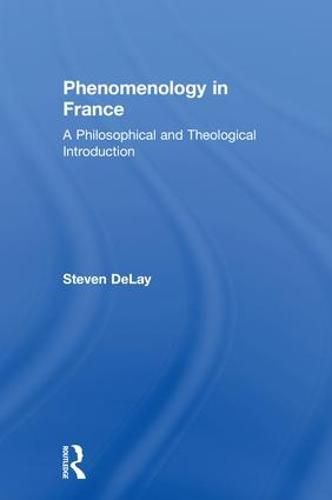Readings Newsletter
Become a Readings Member to make your shopping experience even easier.
Sign in or sign up for free!
You’re not far away from qualifying for FREE standard shipping within Australia
You’ve qualified for FREE standard shipping within Australia
The cart is loading…






This book is an introduction to French phenomenology in the post-1945 period. While many of phenomenology’s greatest thinkers-Husserl, Heidegger, Sartre and Merleau-Ponty-wrote before this period, Steven DeLay introduces and assesses the creative and important turn phenomenology took after these figures. He presents a clear and rigorous introduction to the work of relatively unfamiliar and underexplored philosophers, including Jean-Louis Chretien, Michel Henry, Jean-Yves Lacoste, Jean-Luc Marion and others.
After an introduction setting out the crucial Husserlian and Heideggerian background to French phenomenology, DeLay explores Emmanuel Levinas’s ethics as first philosophy, Henry’s material phenomenology, Marion’s phenomenology of givenness, Lacoste’s phenomenology of liturgical man, Chretien’s phenomenology of the call, Claude Romano’s evential hermeneutics, and Emmanuel Falque’s phenomenology of the borderlands. Starting with the reception of Husserl and Heidegger in France, DeLay explains how this phenomenological thought challenges boundaries between philosophy and theology. Taking stock of its promise in light of the legacy it has transformed, DeLay concludes with a summary of the field’s relevance to theology and analytic philosophy, and indicates what the future holds for phenomenology.
Phenomenology in France: A Philosophical and Theological Introduction is an excellent resource for all students and scholars of phenomenology and continental philosophy, and will also be useful to those in related disciplines such as theology, literature, and French studies.
$9.00 standard shipping within Australia
FREE standard shipping within Australia for orders over $100.00
Express & International shipping calculated at checkout
This book is an introduction to French phenomenology in the post-1945 period. While many of phenomenology’s greatest thinkers-Husserl, Heidegger, Sartre and Merleau-Ponty-wrote before this period, Steven DeLay introduces and assesses the creative and important turn phenomenology took after these figures. He presents a clear and rigorous introduction to the work of relatively unfamiliar and underexplored philosophers, including Jean-Louis Chretien, Michel Henry, Jean-Yves Lacoste, Jean-Luc Marion and others.
After an introduction setting out the crucial Husserlian and Heideggerian background to French phenomenology, DeLay explores Emmanuel Levinas’s ethics as first philosophy, Henry’s material phenomenology, Marion’s phenomenology of givenness, Lacoste’s phenomenology of liturgical man, Chretien’s phenomenology of the call, Claude Romano’s evential hermeneutics, and Emmanuel Falque’s phenomenology of the borderlands. Starting with the reception of Husserl and Heidegger in France, DeLay explains how this phenomenological thought challenges boundaries between philosophy and theology. Taking stock of its promise in light of the legacy it has transformed, DeLay concludes with a summary of the field’s relevance to theology and analytic philosophy, and indicates what the future holds for phenomenology.
Phenomenology in France: A Philosophical and Theological Introduction is an excellent resource for all students and scholars of phenomenology and continental philosophy, and will also be useful to those in related disciplines such as theology, literature, and French studies.